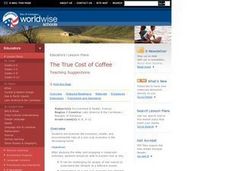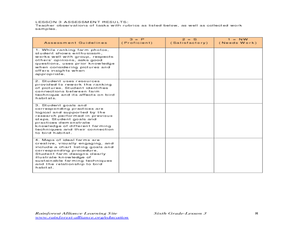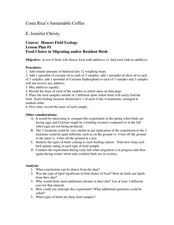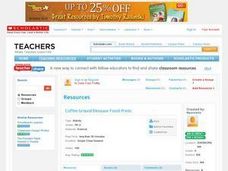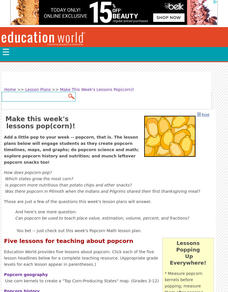Rainforest Alliance
The Long Road to Coffee
During the fourth lesson of a series on Colombia, pupils discover the process to which the coffee plant becomes the coffee we drink. Pupils compare how locally grown foods get into homes to how coffee from Colombia gets into their mug.
Curated OER
The True Cost of Coffee
Students examine the economic, health and environmental risks of being a one-crop country. They explain the risks of relying on one crop. They also identify the factors that resist change.
NASA
Things Are Not Always What They Seem
Science is magic that works. Magical color-changing beads and a coffee can that follows voice commands are just two examples of magic tricks that rely on science. After completing a hands-on activity and an experiment investigating the...
Curated OER
El Salvador: How Can My Breakfast Harm the Birds?
Sixth graders explore how their food choices can have an impact on the rain forests. They examine coffee farming and how their techniques can harm birds in the rain forest. Students design two farms with sustainability of bird habits in...
National Energy Education Development Project
Great Energy Debate
If someone yelled for eight years and eight months, they could produce enough energy to heat one cup of coffee. A lesson on energy encourages scholars to research 10 different energy sources in groups before playing a game. Twenty...
Curated OER
The Long Road to Coffee
Students discover how coffee is processed from a plant, to a drink. In this life cycle instructional activity, students study that cells and organisms go through a cycle of growth and change. Students organize picture cards,...
Curated OER
How can my breakfast help the birds?
Sixth graders design farms with a bird's habitat in mind. In this farm lesson plan, 6th graders research how sun grown coffee destroys a bird habitat, and then they make their own farm with a bird's habitat being preserved. They then...
Curated OER
Costa Rica's Sustainable Coffee
Students experiment to see if birds prefer to eat bird seed with additives vs. no additives. In this experimental lesson students test to see if birds notice a difference between additive and no additive food.
Curated OER
The True Cost of Coffee
Students examine the economic, health, and environmental risks of a one-crop economy in the developing world. They explain how or why it can be challenging for people of one culture to understand the lifestyle of a different society.
Safe Drinking Water Foundation
Demonstration of Water Pollution
In this teacher-led demonstration, your young environmentalists will observe and record how different types of water pollutants look when they are combined. From here, individuals will develop a hypothesis on how the water can be...
Curated OER
Coffee Ground Dinosaur Fossil Prints
Students create fossils to understand how scientists learn about dinosaurs. In this dinosaur lesson, students mix ingredients to make dough and put in objects that can make impressions. Students let fossil dry overnight....
Curated OER
Introductory Lesson on How pH Levels are Determined
Young scholars explore pH levels of different substances. In this instructional activity about pH, students work together in three to four groups to test substances. moving between three different stations performing tests on the...
American Museum of Natural History
What Do You Know About Virtual Water?
Did you know you can conserve water by drinking tea instead of coffee? Learn about other products that use larger amounts of virtual water in an online lesson. Pupils complete a series of questions to test their understanding of the...
Science Matters
Crawly Composters
Get your hands dirty with an interactive lesson that showcases the process of decomposing and returning nutrients back into the soil. After building a compost pile, pupils regularly observe the...
SF Environment
Pre-School Composting and Recycling!
You can never be too young to get involved in composting or recycling. Here is a lesson that has been made for the very littlest learners and it's all about the importance of conservation. They'll sort compostable and recyclable objects,...
Foundation for Water & Energy Education
What is the Water Cycle? Activity B
Curious physical scientists follow a lesson on the properties of water with this lesson on distillation. They observe a miniature water cycle model that filters dirty water into clean water. These two lessons combined are an enriching...
Curated OER
Water Pollution
Fifth graders study the impact of human activity on water quality and on the ecosystems of Earth. After a discussion on the various ways that water can be polluted, groups of youngsters get together to figure out the best way to clean a...
Curated OER
What's Down the Well?
Students examine how environmental engineers determine possible sites for drinking water wells. They listen to a teacher led-lecture, and create their own groundwater well model using a coffee can and wire screening, observing how...
Curated OER
Peregrine Falcon
Young environmentalists study the effects that pesticides have on birds, such as the peregrine falcon. They also look at predator/prey interactions. Some wonderful in-class activities accompany an inventive activity. After an activity...
Curated OER
How Can Clear of Tress Destroy a Community?
Fifth graders brainstorm the relationship between trees and humans to determine how humans benefit from trees and how they benefit from us. They discuss oxygen/carbon dioxide exchange, soil stablization, animal habitat, shade, medicine...
Curated OER
Slash Trash! Reducing, Reusing and Recycling Our Way to Zero Waste
The other "Three Rs" are covered in this lesson: reduce, reuse, and recycle. Over four weeks, conservationists collect data about waste in their own homes. They combine their findings with those of other students in order to analyze...
Curated OER
The Long Road to Coffee
Students organize picture cards of the sequene of how food gets from a farm to their home. They then sequence cards of how coffee grown in Colombia gets to their home comparing the differences.
Curated OER
Water Pollution
Here is a fine lesson plan for fifth graders that will give them an idea of the variety of impacts that human-introduced pollutants have on the environment. After an initial class discussion and teacher-led demonstration, pupils...
Curated OER
Make This Week's Lessons Pop(corn)!
Students create popcorn timelines, maps, and graphs; do popcorn science and math; explore popcorn history and nutrition; and munch leftover popcorn snacks too!,

